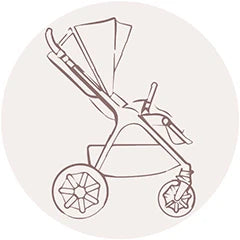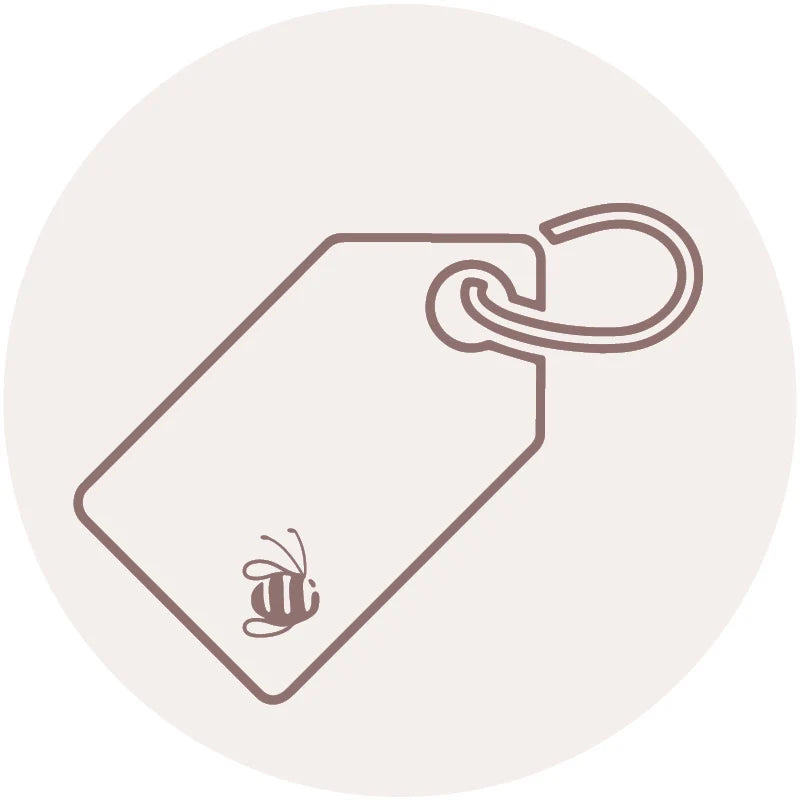Pineapple Silicone Nibble Tray
Pineapple Silicone Nibble Tray
SKU:UTE83-B
Clothing Prem to 18 Months
| Size | Age Guide | Weight | Height |
|---|---|---|---|
| Premature | Premature or Small Newborn | Up to 4Kg | Up to 55cm |
| Newborn | 0-3 months | 4-6Kg | Up to 62cm |
| 3 Month | 3-6 months | 6-8Kg | Up to 68cm |
| 6 Month | 6-12 Month | 8-10Kg | Up to 76cm |
| 12 Month | 12-18 Month | 10-12Kg | Up to 84cm |
| 18 Month | 18-24 Month | 12-14Kg | Up to 92cm |
Clothing 2 to 6 Years
| Size | Age Guide | Height | Chest | Waist | Hip |
|---|---|---|---|---|---|
| 2 Year | 2-3 Years | Up to 100 cm | 56 | 51 | 58 |
| 3 Year | 3-4 Years | Up to 105 cm | 58 | 53 | 60 |
| 4 Year | 4-5 Years | Up to 110 cm | 60 | 55 | 62 |
| 5 Year | 5-6 Years | Up to 115 cm | 62 | 57 | 64 |
| 6 Year | 6-7 Years | Up to 120 cm | 64 | 59 | 66 |
Beanie Size Guide
| Size | Head Circumference | Age Guide |
|---|---|---|
| Premature | 31-35 cm | Premature or Small Newborn |
| Newborn | 35-40 cm | Newborn |
| Small | 40-43 cm | 3-6 Months |
| Medium | 43-47 cm | 6-18 Months |
| Large | 47-52 cm | 18-3 Years |
Sunhat Size Guide
| Size | Head Circumference | Age Guide |
|---|---|---|
| Newborn | 37-40 cm | Newborn |
| Small | 40-43 cm | 3-6 Months |
| Medium | 43-46 cm | 6-12 Months |
| Large | 46-49 cm | 12-24 Months |
| Xtra Large | 49-54 cm | 2-4 Years |
Sleep Pods Size Guide
| Size | Weight | Age Guide | Measurement(Back to Hem) |
|---|---|---|---|
| Newborn | 0-6 kgs | 0-3 Months | 60.5 cm |
| Small | 0-8 kgs | 3-6 Months | 66 cm |
Booties Size Guide
| Size | Age Guide |
|---|---|
| Newborn | 0-3 Months |
| Small | 3-6 Months |
| Medium | 6-12 Months |
| Large | 12-18 Months |
Pretty Brave Baby
| Foot Length (mm) | Insole Length (mm) | EU | UK | Age | INT |
|---|---|---|---|---|---|
| 95-104 | 110 | 16/17 | 2 | 0-6m | S |
| 104-114 | 118 | 18 | 3 | 6-12m | M |
| 114-123 | 127 | 19/20 | 4.5 | 12-18m | L |
| 123-137 | 142 | 21/22 | 5.5 | 16-22m | XL |
Pretty Brave 1st Walker
| Foot Length (mm) | Insole Length (mm) | EU | UK | Age |
|---|---|---|---|---|
| 114-120 | 125-128 | 19 | 3 | 1 yr |
| 120-126 | 132-135 | 20 | 3.5 | 1-2 yrs |
| 126-132 | 138.5-141.5 | 21 | 4.5 | 1-2 yrs |
| 132-138 | 145-148.5 | 22 | 5 | 2 yrs |
Crywolf Swim Nappy
| Size | Length (waist to crotch) | Crotch Width (side to side) |
|---|---|---|
| 0-1 yr | 1-2 yrs | |
| 37 | 38 | |
| 14.5 | 15.5 |
Crywolf Rash Suit
| Size | Length (back neck to crotch) | Chest (arm to arm) | Waist (side to side) | Sleeve (neck to cuff) | Neck Opening(diameter) |
|---|---|---|---|---|---|
| 6-12 Months | 1 yr | 2 yrs | 3 yrs | ||
| 40 | 42 | 44 | 46 | ||
| 25 | 26 | 27 | 28 | ||
| 24 | 25 | 26 | 27 | ||
| 30 | 31.5 | 33 | 34.5 | ||
| 13.25 | 13.25 | 13.8 | 14.3 |
In stock
Couldn't load pickup availability
Overview
Overview
The Haakaa Pineapple Silicone Nibble Tray is the perfect multi functional addition to your little one's feeding journey.
Use it as a separated snack plate, a steaming tray or a freezer tray to create perfectly sized portions of frozen baby food or breast milk for your Fresh Food Feeder. This tray comes with a label slot and five recording cards, making it easy to see at a glance what you've got stored, and when you stored it!
What's Included
What's Included
User Guide
User Guide
Delivery and Returns
Delivery and Returns
- Delivery: Free within NZ on orders over $100 (excluding bulky items) or $8 standard shipping
- Returns: Accepted within 14 days of receipt with proof of purchase
- Some items are excluded from returns including sale items, hardware, car seats, prams, monitors and personal items - please click here for the full list.
Share this product
Recently Viewed Products
Related Blogs
Beginning your baby on solid foods
Starting Solids: A New Chapter in Your Baby’s Feeding Journey 🥄 Introducing your baby to solids is an exciting milestone for both of you! It’s a time for new tastes, textures, and the inevitable messes that come with it. But as your baby reaches the six-month mark, it’s time to introduce them to new foods to complement their milk diet. For the first six months, your baby relies on iron stores from the womb and breast milk or formula. But as those iron stores begin to deplete, solids are needed to boost their nutrition. It’s recommended to continue breastfeeding or bottle-feeding alongside solids until your baby is 12 months old. Solids at this stage complement, rather than replace, their milk feeds. You can also start offering small amounts of water after six months, either in a sippy cup or with meals, to help your baby stay hydrated as they transition to solids. Signs Your Baby Might Be Ready for Solids Here are some signs to watch for that indicate your little one is ready to start eating solids: They seem hungry after milk feeds Can sit up with support and hold their head steady Show interest in your food, possibly reaching out or opening their mouth Make chewing motions when they see food Open their mouth when a spoon comes near Baby’s First Taste: Making Mealtimes Memorable 💛 Starting solids can be an exciting and slightly messy adventure! You can begin with simple, iron-rich foods to complement their milk diet, such as: Iron-fortified rice cereal mixed with breast milk or formula Purées of cooked vegetables like pumpkin, kūmara, or carrot Mashed avocado – easy to prepare and great for baby’s first tastes Purée of cooked apple or pear – mild, easy-to-digest options Purée of cooked chicken or beef – an excellent way to introduce iron A fantastic way to offer baby their first tastes is with the b.box Silicone Fresh Food Feeder. Simply pop in soft fruits or steamed vegetables, and let baby explore with a self-feeding method that doubles as teething relief. Make Mealtimes Easier with the Right Tools The right tools can make the journey into solids so much easier – and a little less messy! The Zazi Clever Spoon Set is designed for tiny hands, and paired with the Clever Bowl with Lid, they're perfect for portioning, feeding, and storing leftovers. The b.box Roll + Go Mealtime Mat keeps the mess contained, while the classic Mum2Mum Wonder Bib or the Mum2Mum Sleeved Wonder Bib makes sure your baby’s outfit stays clean, even on the messiest of days. After all, less laundry means more cuddle time! Moving to Mash As your baby approaches seven months, they’ll likely be ready to try foods with a thicker consistency. Offer them mashed or fork-mashed foods like ripe banana, avocado, small pasta pieces, or cooked egg. These textures are easy for your baby to swallow and great for practicing chewing. At this stage, avoid harder lumps like whole peas, which can pose a choking risk. Embracing Independence Around 8 Months Around eight months, your baby may begin showing an interest in feeding themselves. They may grab the spoon and try to feed themselves – it’s messy, but it’s also a great opportunity for developing their hand-eye coordination. Give them a chance to explore, but always stay close by to offer a helping hand (and a napkin)! We’re Here to Help At Dimples, we know starting solids can feel overwhelming. That’s why we’re always here to support you with expert advice and product recommendations. Visit us in-store or contact our friendly team for any questions – we’ve got everything you need to make this adventure as fun and easy as possible.
Learn moreBreastfeeding Basics and Tips
Understanding the Fundamentals of Breastfeeding Breastfeeding might seem straightforward, but many new moms find it challenging. Patience is essential, and being well-prepared can make the process smoother. Here, we break down the basics to help you get ready for this journey. The Three Stages of Breast Milk Colostrum: The First Stage When your baby is born, your body produces colostrum, a clear or yellowish liquid packed with nutrients, proteins, and vitamins. This small amount is perfect for newborns, helping to protect their digestive tract and immune system. Transitional Milk: The Second Stage Regular breastfeeding will stimulate the production of transitional milk, which appears around the third to fifth day. It looks like a mix of milk and orange juice, rich in lactose, fat, and calories. Mature Milk: The Third Stage By the second week, mature milk replaces transitional milk. This pale, sometimes bluish milk provides all the nutrients, fat, and proteins your baby needs, adjusting its water content in hot weather and boosting antibodies when needed. Achieving a Good Latch Proper latching is crucial to prevent discomfort. A good latch covers both the nipple and the areola and shouldn't be painful. Here’s how to ensure a successful latch: Positioning Your Baby Hold your baby tummy-to-tummy with your breasts, keeping their head aligned with their body. Mouth to Nipple Tickle your baby’s lips with your nipple or express a bit of milk to encourage the rooting reflex. When your baby opens wide, bring them to your breast. Ensuring Proper Attachment A proper latch involves the baby’s chin and nose touching your breast. If necessary, adjust the bottom lip to ensure it isn’t tucked in. Watch for a steady suck-swallow-breathe pattern. Trying Different Positions If you encounter difficulties, experiment with different breastfeeding positions like the football hold or side-lying. Consult a lactation consultant if needed. Maintaining Comfort and Milk Supply Relax and Feed on Demand Stay calm and relaxed to enhance milk production. Allow your baby to feed without time limits, ensuring one breast is fully drained before switching to the other. Recognizing Hunger Cues Signs of hunger include nuzzling your breasts, rooting, sucking on hands or clothing, and making lip-smacking noises. Crying is a late hunger cue. Feeding Frequency Newborns typically feed 8-12 times a day. Some may need to be woken up for feeds if they sleep for more than six hours. Patience and Persistence Breastfeeding takes time and practice. Be patient with yourself and your baby, seeking professional help if needed. With time, breastfeeding will become more natural and enjoyable for both of you. By following these tips, you can create a calm and successful breastfeeding experience, eventually making it look effortless.
Learn moreMust-have items to pack in your nappy bag
The Ultimate Nappy Bag Checklist: Be Ready for Anything Leaving the house without your nappy bag? That’s the kind of chaos every parent dreads. Whether it’s a surprise nappy blowout or a teething meltdown mid-supermarket shop, being prepared can turn potential disasters into minor hiccups. That said, there’s a balance to strike. Overpacking can make your bag heavy and hard to manage — underpacking leaves you without the essentials when you need them most. What you pack depends on your baby’s age, where you’re going, and how long you’ll be out. To make things easier, here’s your ultimate nappy bag checklist - designed to help you leave the house calm, confident, and ready for anything. Start with the right bag You’ll want a nappy bag that’s both practical and stylish. Something that works for both parents and doesn’t scream “baby gear.” Look for one with plenty of compartments, bottle holders, and enough space to fit everything without being bulky. We have a gorgeous range of stylish bags, shop them here. What to pack For changing: Nappies – more than you think you’ll need Baby wipes – either travel packs or your own stash in a reusable snap-lock bag. Nappy rash cream – keep a small tube in your bag. Change mat – compact and easy to clean. Most good nappy bags come with one, you can also get disposable ones. Nappy disposal bags – for dirty nappies or any messy surprises. Hand sanitiser or wipes – for quick cleanups when a bathroom’s not nearby. Spare clothes – at least one full change, maybe two if you’re toilet training. Warm layers in case the temperature drops. For feeding: Bibs – always helpful for dribbles or spills. Bottles and formula – if bottle-feeding, bring everything you’ll need. An insulated bottle can be handy too. Muslin cloth or burp cloth – great for burping and as a lightweight feeding cover. Baby food and utensils – a travel pouch, and spoon and bowl if you’re onto solids. General extras: Teething toy or small distraction – for those fussy moments on the go. First-aid basics – baby sunscreen, plasters Sunhat and beanie – be ready for any weather. Dummy – keep a spare in the bag so you’re never caught short. Wrap – useful as a swaddle, sunshade, blanket, or emergency carrier. Don’t forget Mum’s must-haves: Breast pads – to prevent leaks if you’re nursing. Water and snacks – a must when you're running on empty. Spare top and bra – messes don’t just happen to the baby! Sunscreen and hat – you’ll need protection too. Final tip: restock after each outing Once you’re home, do a quick check and restock your nappy bag so you’re ready to go next time. Think about the different scenarios you might face and pack with those in mind. Multipurpose items help you save space and stay organised — no need to carry the kitchen sink!
Learn moreFormula and bottle-feeding tips for new parents
Everything you need to know about bottle feeding During the first year, your baby goes through a great deal of growth and development. Most babies triple their birth weight by the time they hit their first birthday – so it’s no wonder they need lots of energy to grow! While it’s widely acknowledged that ‘breast is best’, choosing how you feed your baby is an important and completely personal decision. For some women, personal circumstance, cultural beliefs and physical or mental wellbeing mean breastfeeding isn’t an option, and therefore a safe alternative is required. If you’ve decided to bottle-feed (if you’re thinking about it, speak with your midwife, doctor or nurse first), it’s vital to have clear and well-informed information on the safe preparation and use of formula. Here’s what you need to know about formula-feeding your wee one: About baby formula Most formula is made from modified cow’s or goat's milk so the protein level isn’t too high and babies can digest it. Unlike regular milk, formula has added minerals, vitamins, and fats essential for human growth and development, and when prepared correctly, it contains enough nutrients for healthy growth in babies. In New Zealand, there are strict manufacturing regulations in place to make sure that the formula in your local supermarket is always of good quality and safe for your baby. But that doesn’t make the baby aisle any less overwhelming. Here’s a quick breakdown of the kinds of formula you can buy: Cow’s-milk formula Most cow’s-milk formulas sold in New Zealand have a similar nutritional profile – so price doesn’t necessarily mean one is better than another. Casein and whey are the proteins in breastmilk, and cow’s-milk formula has the same proteins. It will either have more casein or more whey – you can find the percentage of each noted on the formula’s ingredient label. Key points: Your baby’s first formula should contain whey as the main type of protein, as it’s the easiest to digest. Some formulas will be labelled ‘follow-on’ or ‘step 2’ – these are casein-dominant formulas best suited for babies aged six months and over. They’re also designed for hungrier babies who are not yet old enough to start solid food. Your baby can stay on the first formula for 12 months and as you start to introduce solids. If your child isn’t reacting well to cow’s-milk formula and you suspect an allergy, it’s best to seek advice from a healthcare professional who can advise you on alternative types of formula. Goat’s-milk formula This type of formula also contains whey and casein proteins, but the casein protein is slightly different from that in cow’s milk. It contains beta-casein (rather than alpha-casein) which is more easily digestible. Again, you can find the protein ratios outlined on the nutritional label. Soy infant formula Made using soya beans as a source of protein, soy infant formula is a vegetarian option. It’s best to seek advice from a healthcare professional before switching to the soy alternative. Gold formula Gold formula contains extra ingredients which aren’t strictly necessary for your baby – but may be beneficial. Here we explain a few: Long-chain polyunsaturated fatty acids (LCPUFAs). Thought to be important in the development of the brain and eyes. Alpha-lactalbumin. Thought to be nutritious for babies because it’s the main type of whey protein in breastmilk. Pro and prebiotics. These help promote the growth of good bacteria and may help maintain a healthy balance of gut bacteria. May be good for eye health. How to prepare baby formula Before you get started, always carefully read and follow the instructions on the formula tin – not all formulas have the same size scoops or are prepared in the same way. Check the use-by date and dispose of formula if it has expired. Bottle-feeding equipment Here’s what you’ll need to bottle-feed: Large bottles (saves you buying new ones as your baby grows) Bottle rings and caps Teats (either silicone or latex is fine, graded according to size of the hole or age of the baby) Bottle brushes Teat brushes A steriliser (optional) Check our handy guide to bottles and teats here! Making up a bottle of formula Step 1 : Boil the kettle and let the water cool for about 30 minutes, until it has reached a lukewarm temperature. You can also do this in advance, storing the cooled boiled water in sterilised bottles in the fridge. Step 2 : Pour the lukewarm water into the bottle before carefully adding the scoops of formula powder (levelling the powder with a clean knife or the tin's in-built level). Seal the bottle with a ring and cap, then shake gently to encourage the powder to dissolve. Step 3 : Before feeding your baby, check the temperature of the formula by tipping a few drops on the inside of your wrist – it should feel lukewarm. Never add anything to the formula, and if your baby doesn’t finish the bottle, throw any leftover formula away within an hour. Warming infant formula If you are not feeding your baby straight away, place formula in the fridge immediately (store at the back of the fridge) with a cap over the teat to prevent contamination. It can be stored for a maximum of 24 hours. Once removed, it’s only safe to use for up to one hour. The safest way to warm formula is to stand the bottle in a bowl of warm water for no longer than 10 minutes as harmful bacteria can grow in prepared formula. After warming, gently swirl the bottle to mix the formula, and test the temperature. If it’s too hot, cool it down by putting it in a bowl of cold water or by running it under the cold tap. Microwaving bottles is not recommended because uneven heating of the milk can burn your baby’s mouth. Cleaning and sterilising Hygiene is essential – your baby’s immune system isn’t strong enough to fight off some diseases yet, and formula-fed infants are at higher risk of gastrointestinal infection. You need to clean your bottles, teats, rings and caps after every feed and before you sterilise them. Tips for cleaning bottle-feeding equipment: Wash all bottles, rings, caps and teats in hot soapy water. Squirt water through the teat holes and use a bottle brush to ensure that everything is scrupulously clean, getting into all those nooks and crannies, then rinse well. Check for any cracks in the teats and throw away any damaged ones. Rinse everything well in hot water and leave them to air dry. After you’ve cleaned your equipment, you need to sterilise everything by boiling, steaming, or with chemicals. Boiling - To sterilise a baby bottle by boiling, place the disassembled bottle parts into a large pot and cover them fully with water. Bring the water to a rolling boil and let it boil for at least 5 minutes to ensure all parts are thoroughly sterilised. Use clean tongs to remove the items and place them on a clean, dry surface to air dry completely. You can buy electric (plug-in) or microwave steam sterilisers. These units 'cook' your equipment at a temperature high enough to kill bacteria. If using chemical sterilisers , follow the instructions on the box or packet. If you’re unsure, seek help from a professional Don’t be afraid to take your time deciding about feeding your baby. The most important consideration is that your baby is comfortable and well-fed, and you’re able to enjoy this special (albeit exhausting!) time with your newborn. Get the information you need to make an informed decision, and if you’re not sure, consult with your health professional, who’s in the best position to give you accurate advice for your baby and his or her needs.
Learn more








